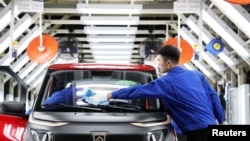China’s largest automaker, SAIC Motor, has demanded an official European Union hearing regarding tariffs on imported electric vehicles that took effect Friday, pending a final decision in November.
The tariffs imposed by the EU add provisional duties of up to 37.6% on Chinese EV imports.
Chinese Foreign Ministry spokesperson Mao Ning spoke at a press briefing Friday, saying Beijing would "take necessary measures to firmly safeguard its legitimate rights and interests.”
The Chinese state-owned electric automobile manufacturer said in a statement it would, “formally request that the European Commission holds a hearing" in order to “practically uphold our legal rights and interests and those of our global customers.”
The EU’s executive arm “committed mistakes when calculating the subsidies,” reported Chinese state-owned news agency, Xinhua.
It added that the European Commission ignored relevant information submitted by SAIC.
After an eight-month investigation, the European Commission found that government assistance enables Chinese electric carmakers to undercut EU competitors on prices, boosting their market share and threatening European jobs.
The higher tariffs are “a means to correct an imbalance,” said European Commission spokesman Eric Mamer on Thursday.
Because the tariffs are provisional, they will be kept track of but will not need to be paid until EU governments confirm them before November 2.
Before the official vote, China hopes to continue talks with the EU to reduce the tariffs.
"Only through open dialogue and cooperation can China and the EU ... jointly build a global green, low-carbon economy," said SAIC Motor in its statement.
China’s share of electric cars sold in the EU market jumped from 3.9% in 2020 to 25% by September 2023, said the European Commission.
The EU fears China’s growing market share could eventually hinder the continent’s ability to grow its own green technology and threaten 2.5 million auto industry workers as well as 10.3 million more people whose jobs indirectly depend on producing electric vehicles.
Other countries have taken similar action. The United States has boosted tariffs on Chinese EVs from 25% to 100%, while Canada is considering a tariff hike.
Some information for this report came from The Associated Press, Reuters and Agence France-Presse.





